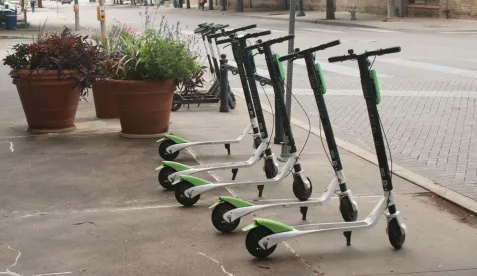Riding a scooter up and down the block was a common and enjoyable pastime for many when they were kids. Now, the child’s kick scooter has been reimagined as an environmentally friendly and nostalgia-filled commute option: the electric scooter. Electric scooters have cropped up in major cities across the country, including Austin, Nashville, Los Angeles, San Francisco, Scottsdale, Washington, D.C., and Atlanta. The scooters are affordable ($1.00 for the first minute and less after that) and easy to access. They are dockless and so bring mobility to people who otherwise don’t own a car or live near public transit, remove congestion from the roads, and help cities go green.
Scooter companies, however, have not enjoyed a completely smooth ride. But they are addressing the challenges posed by their new product and emerging as a safe and convenient transportation option. They are also providing a roadmap for other new technology companies to respond quickly and creatively to local government and customer complaints.
Preventing Problematic Docking
A great advantage of scooters is that they are dockless and thus not confined to areas that already enjoy ample public transit options. But sometimes the lack of fixed docking locations can pose a problem. For instance, San Francisco impounded 66 scooters in April 2018 after finding them blocking public sidewalks. Scooter companies are taking action to ensure that users park the scooters out of the way of pedestrians when they are done.
One company, Bird, issued a “Save Our Sidewalks” pledge and sent it to the CEOs of LimeBike, Ofo, Mobike, and Jump, other dockless transportation companies, encouraging responsible maintenance and growth of the vehicle fleet to keep them out of pedestrians’ paths.
Other companies have instituted procedures to ensure proper docking. For example, LimeBike asked users to take a photo to verify proper docking before they are allowed to check in the scooter at the end of a ride.
Scooter companies also employ “chargers” to pick up the scooters and charge them overnight. These chargers also look out for – and move – scooters that have been parked improperly.
Additionally, dockless bike-share companies have imposed fines on improperly parked bikes – determined via built-in GPS and no-park zones – and have rewarded properly parked bikes with prizes like free rides.
Innovative and proactive measures like these have proven effective in addressing a potential point of contention with municipalities and pedestrians, ensuring that scooter companies can continue to provide their product to meet the public’s demand for safe and affordable transportation by electric scooter.
Promoting Safe Riding
As with any activity, riding an electric scooter poses some risk, such as falling off. But scooter companies have taken precautions to ensure that people remain as safe as possible during use, including by prohibiting people from operating scooters on sidewalks and disallowing double riding.
Additionally, scooter companies’ terms of use require riders to wear helmets. Moreover, those companies are helping states to enforce helmet laws. Bird has sent out 22,500 free helmets to riders to enforce compliance with helmet laws, and another company, Skip, plans to hire ambassadors to hand out helmets and offer general safety advice on the street.
Scooter companies also prevent some forms of unsafe riding by locking all use between the hours of 9 p.m. and 4 a.m.
And companies are requiring riders to be over 18 years of age with proof of driver’s license. Users not only need to provide a photo of both sides of their license, but they also agree to terms stating, for example, that they are “familiar with the operation of the product, and are reasonably competent and physically fit to use the product.”
Perhaps the simplest and most effective form of proactive safety measures is education. Scooter companies like Skip and Bird offer scooter education courses and pamphlets to give inexperienced riders a true picture of what they’re signing up for. Scooter companies warn users to watch out for their surroundings to limit hard stops that can send them over the handlebars, and their terms of use prohibit riders from using phones, listening to music, and operating under the influence of drugs or alcohol. This process mirrors the one that docked bike-share companies like Divvy in Chicago have already employed. Divvy memberships include an online “Rules of the Road” guide to keep riders – and pedestrians – safe while bicycles are in operation, recommending that riders plan their route and put away distractions while riding.
Bicycles, skateboards, and scooters have been popular modes of transportation for decades. Dockless electric scooter companies have already taken action to avoid the challenges accompanying the roll-out of their product and offer a new way to travel. Scooter companies have influenced users and other alternative transportation companies alike to get on board with a new kind of transit – and to do it safely.



 />i
/>i

